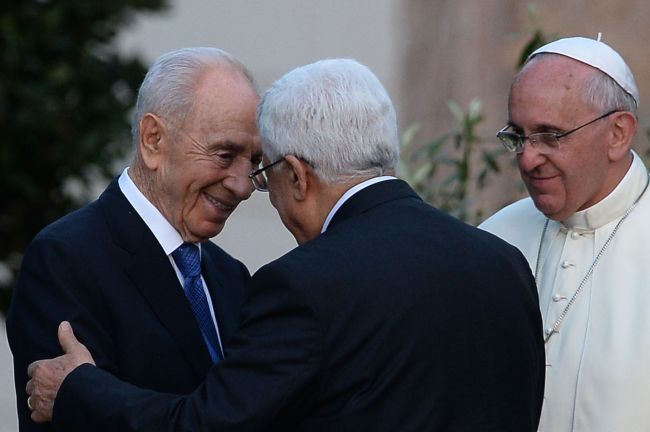VATICAN CITY (AFP) ― Pope Francis on Sunday hosted an unprecedented joint peace prayer in the Vatican with Israeli President Shimon Peres and Palestinian leader Mahmud Abbas in a symbolic gesture aimed at fostering dialogue.
Abbas and Peres greeted each other warmly after arriving in the Vatican and meeting Francis outside his residence, along with the Orthodox Patriarch of Constantinople Bartholomew I who was also present.
All four then took a white minibus to the Vatican Gardens for the ceremony, after which Abbas, Peres and Francis are expected to plant an olive tree.
Peres said it was “an unusual call for peace,” which included Christian, Jewish and Muslim prayers.
Abbas and Peres greeted each other warmly after arriving in the Vatican and meeting Francis outside his residence, along with the Orthodox Patriarch of Constantinople Bartholomew I who was also present.
All four then took a white minibus to the Vatican Gardens for the ceremony, after which Abbas, Peres and Francis are expected to plant an olive tree.
Peres said it was “an unusual call for peace,” which included Christian, Jewish and Muslim prayers.

Abbas said he hoped the ceremony would “help Israel decide” to make peace and told La Repubblica daily that the pope’s invitation had been “courageous.”
“With this prayer we are sending a message to all believers of the three major religions and the others: the dream of peace must not die,” he said.
Peres, who is 90 years old and will be stepping down next month, was quoted by his office as saying that the spiritual call for peace was “very important.”
“I hope the event will contribute to promoting peace between the two sides and throughout the world,” he said, adding that the conflict was “both political and religious” and “religious leaders resonate.”
Tensions are running high between the two sides following the formation of a new Palestinian unity government backed by the Islamist group Hamas.
Israel has since announced plans for building 3,200 new settler homes and has said it will boycott what it denounces as a “government of terror.”
Peres on Sunday said the Palestinian unity government was “a contradiction that can’t last very long,” but Abbas defended it saying: “One should never reject a chance for dialogue, internally as well.”
The Vatican is being realistic about the ceremony, which is unlikely to have any immediate effect.
“Nobody is fooling themselves that peace will break out in the Holy Land,” said Father Pierbattista Pizzaballa, the head of the Franciscan Order in the Middle East who is organizing the historic event.
“But this time to stop and breathe has been absent for some time,” he told reporters at a briefing, adding: “Not everything is decided by politics.”
Francis made the offer to Abbas and Peres on his first visit as pontiff to the Middle East last month and ahead of the meeting on Sunday he reiterated his call for a Catholic Church able to “shake things up.”
He has admitted it would be “crazy” to expect any Vatican mediation in the Israeli-Palestinian conflict but said that praying together might help in some way.
In a tweet from the Argentine pontiff’s @pontifex account on Saturday, Francis said: “Prayer is all-powerful. Let us use it to bring peace to the Middle East and peace to the world.”
The Vatican has defined the meeting as an “invocation for peace” but has stressed that it will not be an “inter-religious prayer,” which would have posed problems for the three faiths.
Prayers were recited in the chronological order of the three monotheistic religions, starting with Judaism, followed by Christianity and then Islam.
The prayers from each included an “invocation for forgiveness” and “invocation for peace” and were read in Arabic, English, Hebrew and Italian.
Rabbi Abraham Skorka and Muslim professor Omar Abboud, two friends of Francis’s from Buenos Aires who travelled with him and prayed together on his trip to the Middle East also attended.
Every detail of the event has been carefully planned.
Friday was ruled out since it is a Muslim holy day and Saturday for the same reason for the Jewish community, while Sunday is Pentecost for Catholics ― a day of celebration of the Holy Spirit considered appropriate for the event.
The choice of the Vatican Gardens as a location is also significant since it was considered the most neutral territory within the Vatican City, with none of the Christian iconography that might be seen as offensive to the other two faiths.
-
Articles by Korea Herald




![[Herald Interview] 'Amid aging population, Korea to invite more young professionals from overseas'](http://res.heraldm.com/phpwas/restmb_idxmake.php?idx=644&simg=/content/image/2024/04/24/20240424050844_0.jpg&u=20240424200058)












![[KH Explains] Korean shipbuilding stocks rally: Real growth or bubble?](http://res.heraldm.com/phpwas/restmb_idxmake.php?idx=652&simg=/content/image/2024/04/25/20240425050656_0.jpg&u=)

